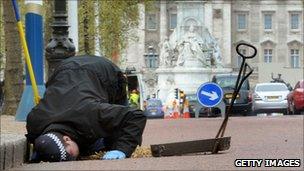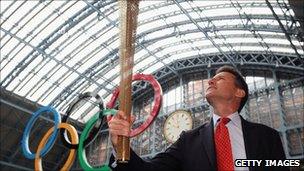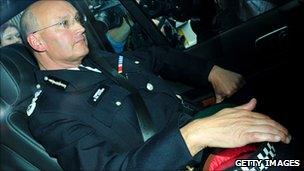London 2012: Police must strike security balance
- Published

Security checks: 12,000 officers will be involved in policing the Games across the UK
With a year to go to the London 2012 Games, BBC London's correspondents consider how well prepared the capital is and whether the many promises made are being delivered.
"This is a juggernaut that's coming and it's not going to stop." The words from the man responsible for ensuring "the greatest show on Earth" will be safe and secure for all.
Chris Allison, the national Olympic security co-ordinator, has just a year before the Games start and the pressure is on.
"We're expecting the terrorism threat level to be severe," he recently told a gathering of senior police officers from around the UK.
"In fact, I think it will be right up near critical. They won't call it critical but it will be very close to it. The top end of severe."
This means a terrorist attack is "highly likely", according to the official grading system, external and comes despite the overall threat level to the UK being downgraded earlier this month.
'Consent of community'
But Mr Allison was also keen to stress to his audience the style of security at London 2012.
"It's not a security event at which a bit of sport will be played," he said. "We sold the Games on the traditional, unarmed British cop providing the security, working with the consent of the community.
"It won't be policed by the military."
It will be a 64-day operation, from when the Olympic village opens to the time the Paralympic village closes.
With 34 venues across Britain, it is a mind-boggling task of planning, planning and more planning.
For instance, Essex Police will be looking after the mountain biking event at Hadleigh Farm and Surrey Police will have the athletes' village and the men's 156 mile cycling road race.
The latter will be impossible to fence off and therefore crowds won't have to buy tickets. The difficulty will be that officers will be unable to search or screen people.
Hertfordshire Police has the canoe slalom venue in Broxbourne while the Dorset force will police the sailing events at Weymouth and Portland.
National teams will be scattered across the UK and Olympic football matches will be held in Glasgow, Cardiff, Manchester, Newcastle, Coventry and London.
Soft targets
Supt Simon Hawkins, a senior planning commander, said: "We only get one chance at delivery and no matter how many 'what ifs' you plan for, something unknown could happen."
On peak days, there will be 12,000 officers, with three quarters of them based in London.
Transporting, feeding and accommodating them will be among the mundane but essential tasks.
The testing and exercising of security in London is already under way and yet Mr Allison, who's an assistant commissioner at Scotland Yard, warned: "If you secure the venues so the opposition [terrorist] can't get in, they will look for a soft target like parallel events linked to the Olympics but with less security."
Some of the other risks will be: ticket touts, fraudulent websites, protesters, domestic extremism, crowd management and even a potential heatwave.
And let's not forget there's a 70-day torch relay, which will run through every force area in the country.
At 5am on 19 May 2012, the relay begins at Land's End. There are 28 officers, who are in training now, to protect the 8,000 torch-bearers from being jumped upon by the fanatic, the foolish or the fixated.
'Torch kiss'
One of the Met's key roles is to ensure the so-called "mother" flame on the Olympic torch does not go out before it reaches the Olympic stadium in Stratford, east London.
Supt Claire Johnson said: "The 'torch kiss' must take place securely. It is where one torch lights the flame of another torch.

A key role for the police will be to protect the 8,000 Torch Relay runners
"There are 8,000 individual torches that have to be lit and passed on. This is one of the most vulnerable points of the whole relay."
She added: "My team's overall objective is to ensure that the torch bearer has nothing else to worry about other than really enjoying their moment and spotting their mum or dad in the crowds lining the streets. I don't want them worrying that someone is going to take the torch from them."
Meanwhile, recent troubles at the top of Britain's biggest police force initially raised concerns about the delivery of the Olympics.
Sir Paul Stephenson resigned as commissioner over the News of the World phone-hacking scandal because it was apparently threatening to become a serious distraction in the run-up to the Games.
And within 24 hours, the head of counter-terrorism John Yates also fell on his sword.
Contrary to fears that the crisis could disrupt the London 2012 planning, Scotland Yard has said it is business as usual.
Low morale
Mr Yates has been replaced by Assistant Commissioner Cressida Dick, who was cleared of any personal blame in the shooting dead of an innocent Brazilian at Stockwell Tube in July 2005.
However, morale among the rank and file is said to be "at rock bottom".

Despite Met Commissioner Sir Paul Stephenson's resignation it is "business as usual"
That is more though to do with imminent major reform and cuts in police budgets than losing their supreme leader, according to the Met branch of the Police Federation.
Its chairman Peter Smyth also pointed out that 20% cut in Whitehall grants could affect the ability of some forces to provide help with specialist roles like firearms officers or dog handlers.
A spokesman for the Association of Chief Police Officers insisted it is working with chief constables across the country to maintain resources.
The Olympic security budget is £475m, with a further £125m available. So far, that's thought to be enough although things could change from now until the Games.
But whatever financial straitjacket the government may be in, most observers agree that they wouldn't dare penny-pinch on security.
The alternative of failure would simply be too high a price to pay.
- Published18 July 2011
- Published17 August 2011
- Published5 July 2011
- Published24 June 2011
- Published19 May 2011